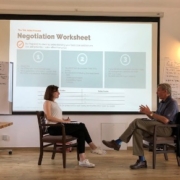Help Your Salespeople Hold Pricing
How will you focus your team this month to successfully close business and maximize revenue potential? One key way is to avoid discounting. This may be easier said than done, especially in the fourth quarter when buyers are working hard to get the best deals possible. But, here are two proven skills we teach our clients in every workshop we run.
Prove Value
This is one of the most fundamental and important skills we work on with salespeople, and it is central to any customer-focused selling methodology. In order to avoid heavy discounting at the end of the sales cycle, sellers must thoroughly understand their customers’ primary business objectives, the key challenges they face that prevent them from achieving those objectives, and the financial impact of doing nothing. Then, they must align the specific product/service capabilities with those challenges in the form of a question, such as “if you had a printing service that could turn around jobs in 24 hours and offers free delivery, how would that solve the challenge you’d mentioned related to compressed timelines and skyrocketing costs?”
Once that value has been established, when buyers ask for the discount at the end of the sales cycle (they will ask for some concession), sellers can return to the value they had both agreed their product or service would bring. When asked for the discount, a seller might say, “you agreed that using our printing services would save you an estimated $50,000/yr in rush charges and delivery fees. Has anything changed since our last conversation?” Reminding buyers of the value of your solution and the cost to them of not changing is key to closing business without price concessions.
For more on the questions sellers should ask in order to thoroughly establish value, take a look at our three-part series “Helping Your Customers Achieve Their Objectives”.
Refine Negotiation Skills
Proving value is something all good sellers do at the beginning of the sales cycle, while skillful negotiating happens at all stages. You’ll often hear sellers say, “he’s just a good negotiator,” as if it’s something you’re born with and you either have it, or you don’t. Nothing could be further from the truth. All salespeople can be trained to be great negotiators. Here’s what they must know:
- Have a negotiation plan – you must be prepared for a negotiation – you can’t just “wing it”. Before walking into any closing meeting, sellers should have a plan in place to respond to pressure.
- Know your floor – calculate the lowest price you’ll go to in order to preserve margin and revenue opportunities for you and your company.
- Push back – remind your buyer about the agreed-upon value of your product, or if they’re prepared to deal with the cost of not moving forward.
- Offer other concessions – be ready to offer your customer other concessions that aren’t related to price, things like extended warranty, training, a dedicated service rep, etc. These offer your customers value without eroding your margins. But…if you do offer something, be sure to ask for something in return. What can your customer give you? Think about things like exclusives, referrals, testimonials, etc.
- Be prepared to walk away/Have a full pipeline – there are times when a buyer will not move forward without unreasonable discount requests, and good sellers must be prepared to walk. Tell your buyer, “I’m not going to be able to offer you the discount you’re requesting. But, what I would like to do is take some time to think about our conversation today and get back with you next week.” Sometimes knowing that they’ve pushed you as low as you’ll go is all a buyer needs to move forward.
- PRACTICE– as with all skill development, practice is key to mastery. Role-play negotiations to prepare for big meetings. Practice pushing back and offering non-price concessions in exchange for something of value to your organization.
In summary, ensuring your sellers are able to prove value and negotiate effectively is key to helping them avoid the price concessions that customers are sure to request .

